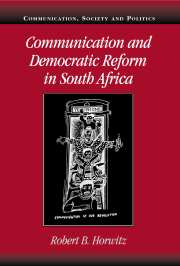Book contents
- Frontmatter
- Contents
- List of Tables
- Preface and Acknowledgments
- List of Acronyms and Abbreviations
- 1 Introduction and Overview
- 2 The Ancien Régime in the South African Communications Sector
- 3 “Sharing Power without Losing Control”: Reform Apartheid and the New Politics of Resistance
- 4 “Control Will Not Pass to Us”: The Reform Process in Broadcasting
- 5 “All Shall Call”: The Telecommunications Reform Process
- 6 Free but “Responsible”: The Battle over the Press and the Reform of the South African Communication Service
- 7 Conclusion: Black Economic Empowerment and Transformation
- Appendix
- References
- Index
4 - “Control Will Not Pass to Us”: The Reform Process in Broadcasting
Published online by Cambridge University Press: 04 December 2009
- Frontmatter
- Contents
- List of Tables
- Preface and Acknowledgments
- List of Acronyms and Abbreviations
- 1 Introduction and Overview
- 2 The Ancien Régime in the South African Communications Sector
- 3 “Sharing Power without Losing Control”: Reform Apartheid and the New Politics of Resistance
- 4 “Control Will Not Pass to Us”: The Reform Process in Broadcasting
- 5 “All Shall Call”: The Telecommunications Reform Process
- 6 Free but “Responsible”: The Battle over the Press and the Reform of the South African Communication Service
- 7 Conclusion: Black Economic Empowerment and Transformation
- Appendix
- References
- Index
Summary
The political dynamic of the first couple of years after February 1990 consisted of the government positioning itself for negotiations and moving ahead in “reform” efforts that would alter the nature of the relationship between the economy and the state, while the ANC found itself in catch-up mode, trying to make a rapid transition from an exiled liberation movement to a functioning political party. The general political situation was, of course, more complicated than this. From 1990 to 1992 the Afrikaner hard-line and shadowy movement of military operatives (called by observers the “Third Force”) engaged in a largely successful effort to disturb the path of negotiations by killing key political persons, fueling civil strife, and exacerbating the hostility between the ANC and the Inkatha Freedom Party. But in most of the issues of the 1990–94 transition period, the main protagonists were the National Party and the ANC. This was particularly true in the media policy arena. The Democratic Party was occasionally active in the debate, particularly when broadcast issues entered the CODESA constitutional negotiations, but in the end was a minor player. The Conservative Party, the Pan-Africanist Congress, and the Inkatha Freedom Party were virtually invisible in the media policy arena.
The National Party's various policy thrusts – particularly those concerning the parastatals – were ensconced within a stealthy bit of politics that amalgamated a needed transformation of old apartheid state-owned enterprises with a stratagem to secure white dominance by establishing market-oriented structures for these institutions.
- Type
- Chapter
- Information
- Communication and Democratic Reform in South Africa , pp. 120 - 177Publisher: Cambridge University PressPrint publication year: 2001

